PROFILE - Nelson Mandela's Leadership Style
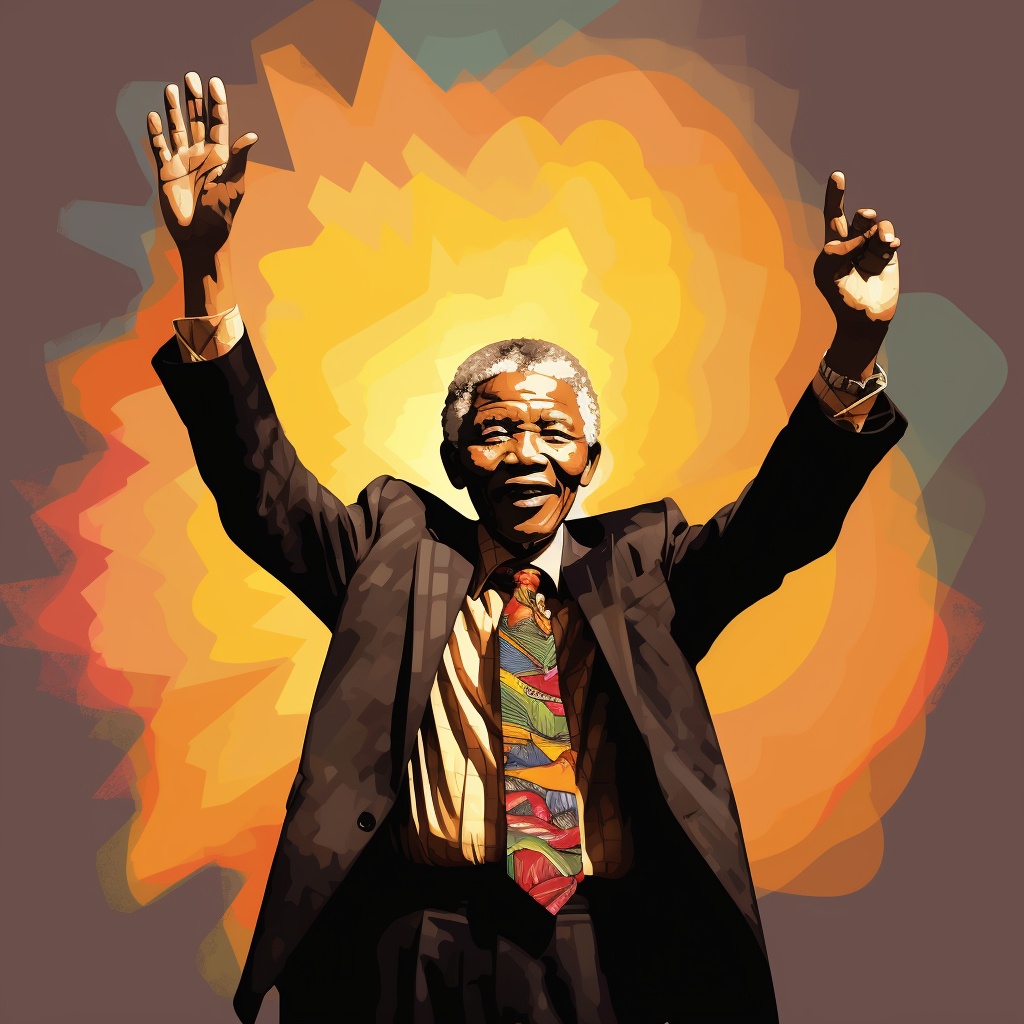
Nelson Mandela, a towering figure of the 20th century, left an indelible mark on the world with his unwavering commitment to justice, peace, and reconciliation.
His journey from a young activist to the first black president of South Africa serves as a testament to the power of resilience, diplomacy, and an unyielding dedication to the greater good. But what were the forces and experiences that shaped this remarkable man and his transformative Nelson Mandela’s leadership?
In this profile, we will delve deeper into the pillars of Mandela’s leadership, exploring his early life and influences, the lessons learned during his 27-year imprisonment, and the pivotal role he played in dismantling apartheid and building a new democratic South Africa.
We will also examine the global impact of Nelson Mandela’s leadership and the enduring legacy he leaves behind.
Key Takeaways
- Unearth the powerful pillars of Nelson Mandela’s leadership, shaped by his early life and mentorship
- Followed courageously with joining the African National Congress to fight for civil rights
- Persevered through 27 years in prison, leading South Africa towards nation-building & social justice, inspiring generations worldwide.
The Making of an Icon: Early Life and Influences
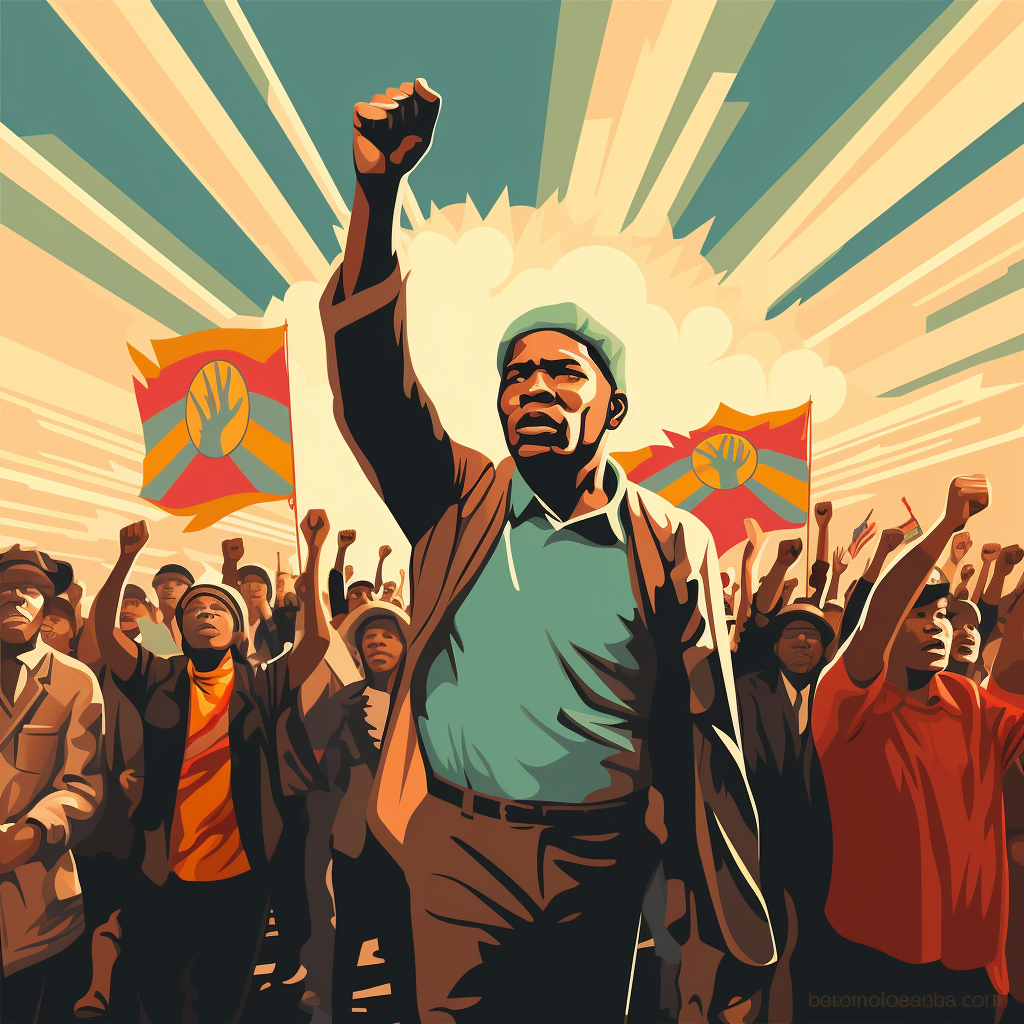
Young Mandela began his journey under the guidance of his mentor, Chief Jongintaba Dalindyebo, who taught him the values of humility, patience, and listening. These lessons molded Mandela’s leadership style and became an integral part of Nelson Mandela’s story.
His dogged pursuit of education led him to earn a Bachelor’s degree, followed by a postgraduate diploma in law, and culminated in an LLB in 1989, despite having failed several exams along the way.
Mandela acknowledged the inevitability of failure on his path to greatness, underscoring the power of resilience and perseverance.
The Role of Chief Jongintaba Dalindyebo
Chief Jongintaba Dalindyebo, the acting regent of the Thembu nation, adopted Nelson Mandela after his father’s death in 1927, providing a nurturing environment that fostered the young Mandela’s growth. Under the Chief’s mentorship, Mandela grasped the importance of inclusivity and the value of listening to others through sessions where everyone was encouraged to voice their concerns and opinions.
This approach to leadership left a profound impact on Mandela, shaping his belief in the power of dialogue and consultation, which would later guide his actions as a political leader.
Joining the African National Congress
Mandela’s unwavering commitment to fight for the civil rights of Black South Africans led him to join the African National Congress (ANC) in 1944. As a member of the ANC, Mandela fervently advocated for the end of racial segregation and held the prestigious position of president from 1991 until 1997.
The ANC was a key player in the anti-apartheid movement, initiating the Defiance Campaign in 1952 and adopting the Freedom Charter. These actions contributed significantly to the fall of apartheid and the advent of democratic rule in 1994.
The Power of Resilience: 27 Years in Prison
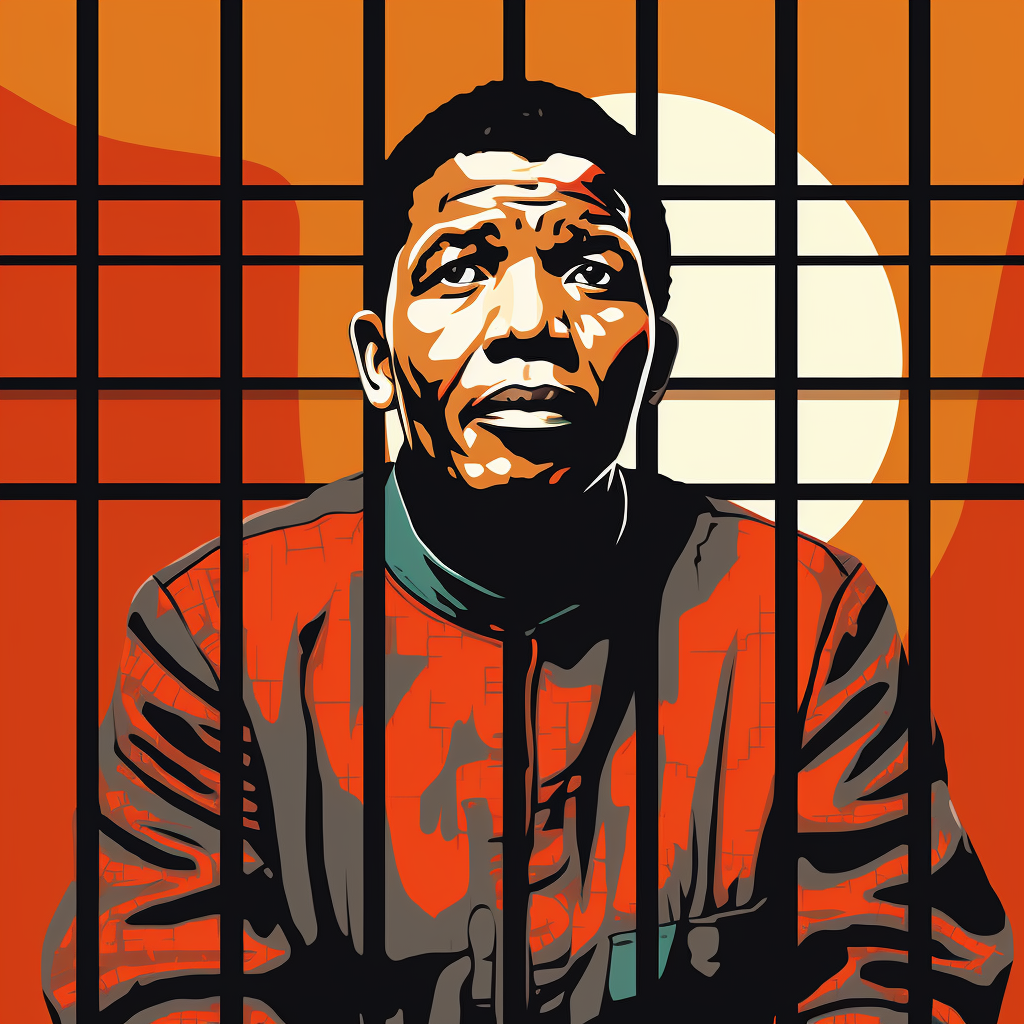
Mandela’s 27-year imprisonment showcased his remarkable resilience and capacity to grow from challenging circumstances, which were essential traits of his leadership. Despite enduring:
- freezing winter nights
- suffocating summer days
- poor food
- the constant threat of physical and psychological abuse
Like Martin Luther King, Mandela remained steadfast in his principles, refusing to compromise his anti-government views.
He viewed his time in prison as an opportunity for learning and growth, fostering an inner strength that later became invaluable in his fight for justice and equality.
Robben Island Experience
During his time on Robben Island, Mandela faced incredibly harsh conditions, confined to a small cell without a bed or plumbing. Despite these challenges, he persevered, using his experience to cultivate his resilience and determination. Mandela empowered himself by learning to listen intently to the voices of his enemies, gaining invaluable insight into the nature of his adversaries.
Mandela’s daily routine on Robben Island involved strenuous manual labor, especially in a limestone quarry. Yet, he maintained a strict exercise routine, rising early at 5 a.m. to keep his body and mind sharp. This dedication to physical and mental discipline, even in the face of adversity, demonstrated the unwavering resolve that would later define his leadership.
Learning from Adversity
Mandela’s capacity to learn from adversity and hold onto hope during his imprisonment became a fundamental aspect of his leadership style. His capacity to withstand hardship and stay firm in his ideals became legendary, acting as a source of motivation for others.
Mandela believed in the power of unity among fellow prisoners and ignited hope among them, demonstrating the strength of hope, unity, and perseverance.
Negotiating the End of Apartheid: Diplomacy and Reconciliation
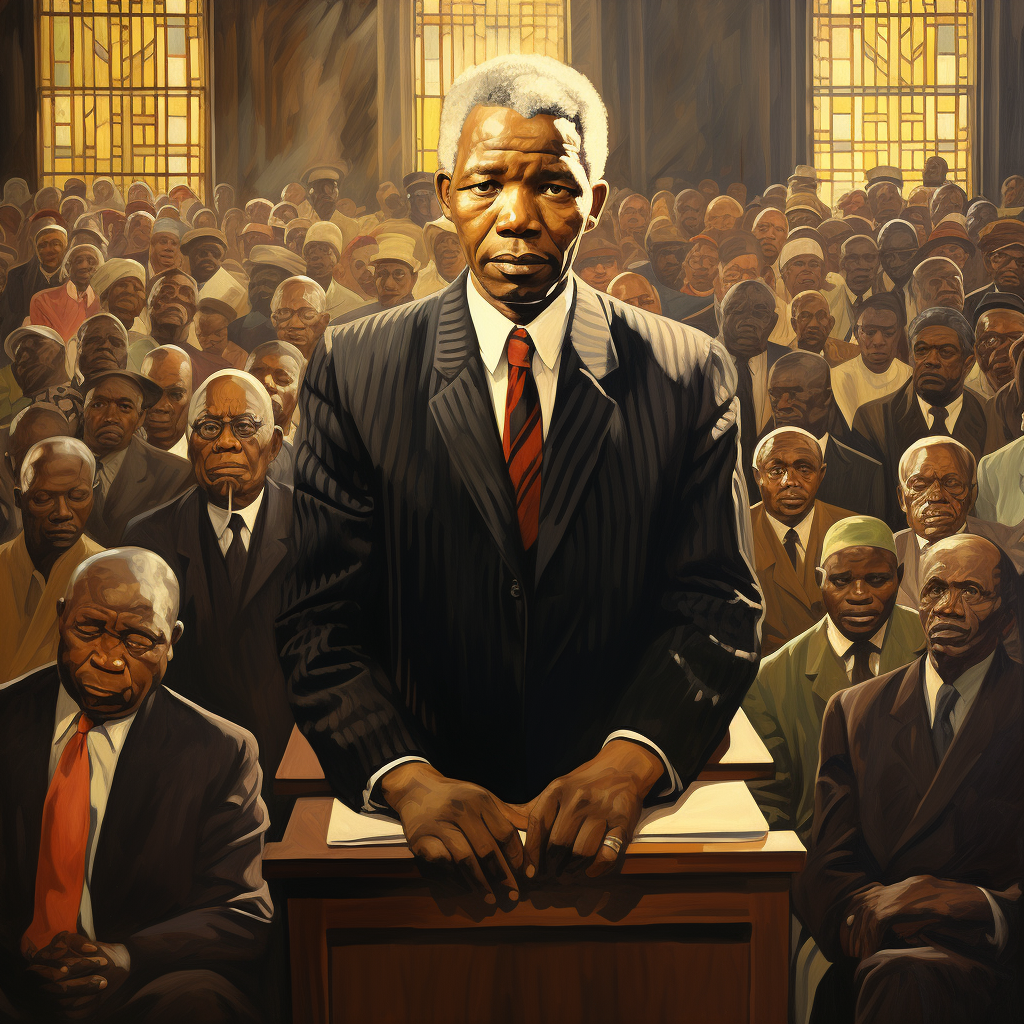
Mandela’s role in negotiating the end of apartheid highlighted his diplomatic skills and dedication to reconciliation. His remarkable ability to build relationships, foster trust, and engage in constructive dialogue with the apartheid government and other stakeholders was instrumental in creating an atmosphere that enabled a peaceful resolution.
Mandela’s diplomacy aided in bridging divides, enabling compromise, and ultimately led to the end of apartheid and the inception of a democratic South Africa.
Dialogue with the South African Government
Mandela’s dialogue with the South African government led to the dismantling of apartheid and the establishment of a democratic South Africa. By advocating for a non-racial society and a peaceful transition to democracy, Mandela embraced the need for change and joined forces with F.W. de Klerk to negotiate a new constitution that would effectively dismantle the apartheid system.
During his negotiations with the South African government, Mandela encountered numerous challenges such as the deeply rooted apartheid system, internal resistance met with police brutality, administrative detention, and restrictions on freedom of speech. To overcome these obstacles and achieve a successful negotiation, Mandela employed strategies such as consensus-building, acceptance of opposing views, and nonviolent tactics like strikes and demonstrations.
Establishment of the Truth and Reconciliation Commission
Under Mandela’s leadership, the establishment of the Truth and Reconciliation Commission was a significant step towards healing the nation and fostering unity. The Commission, led by Archbishop Desmond Tutu, aimed to promote national reconciliation and unity in a spirit of understanding, addressing the injustices of the apartheid era.
The Truth and Reconciliation Commission allowed victims of human rights abuses to share their stories and experiences, providing a platform for healing and forgiveness. It also created a public record of the atrocities committed under apartheid, paving the way for a more transparent and accountable government in the new democratic South Africa.
Becoming South Africa's First Black President: Leadership in Transition and Nation-Building
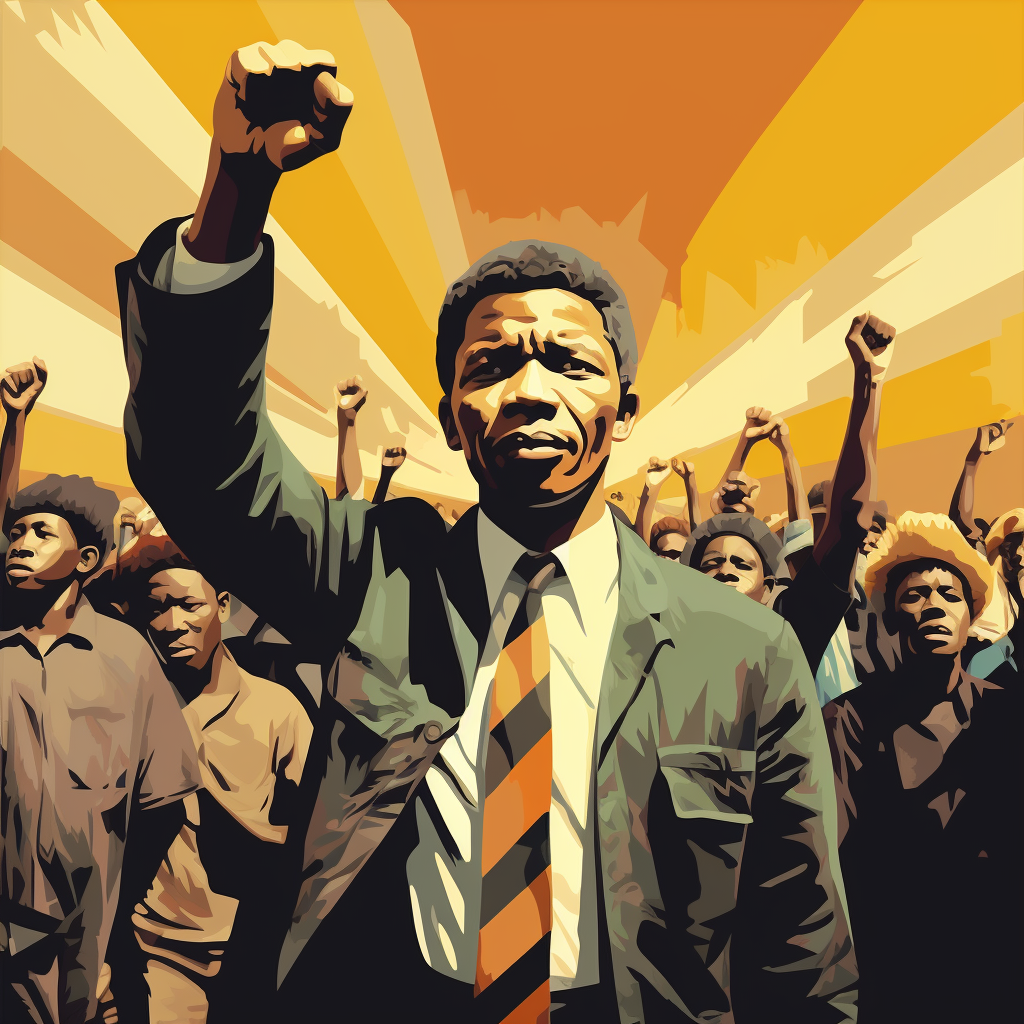
As the first black president of South Africa, Mandela prioritized inclusiveness, unity, and social justice, creating a new nation built on the foundations of equality and harmony. His presidency marked a significant turning point in the country’s history, as he worked tirelessly to dismantle the remnants of apartheid and build a brighter future for all South Africans.
Inclusiveness and Unity
Mandela emphasized the importance of inclusiveness and unity in building a new nation. As president, he welcomed all South Africans, regardless of race or background, which enabled national reconciliation and unity. Mandela’s leadership was essential in the formation of a government of national unity, providing stability and creating a more inclusive political system, moving away from the legacy of the National Party.
His vision of a rainbow nation, a harmonious coexistence of individuals of all races and ethnicities, has left a profound impact on South Africa’s political landscape. Mandela’s commitment to inclusiveness and unity continues to inspire leaders and activists around the world, serving as a powerful reminder of the transformative power of hope, reconciliation, and collective action.
Commitment to Social Justice
Guided by his commitment to social justice, Mandela’s policies and actions as president aimed to ensure a more equitable society for all South Africans. He championed values such as women’s empowerment, access to quality education, and social cohesion, working tirelessly to reduce inequality and poverty in South Africa.
His dedication to social justice also played a major role in shaping the South African constitution, which sought to address the injustices of apartheid and create a more just and equitable society. Mandela’s unwavering commitment to social justice left a lasting legacy that continues to inspire leaders and activists worldwide.
The Global Impact of Mandela's Leadership
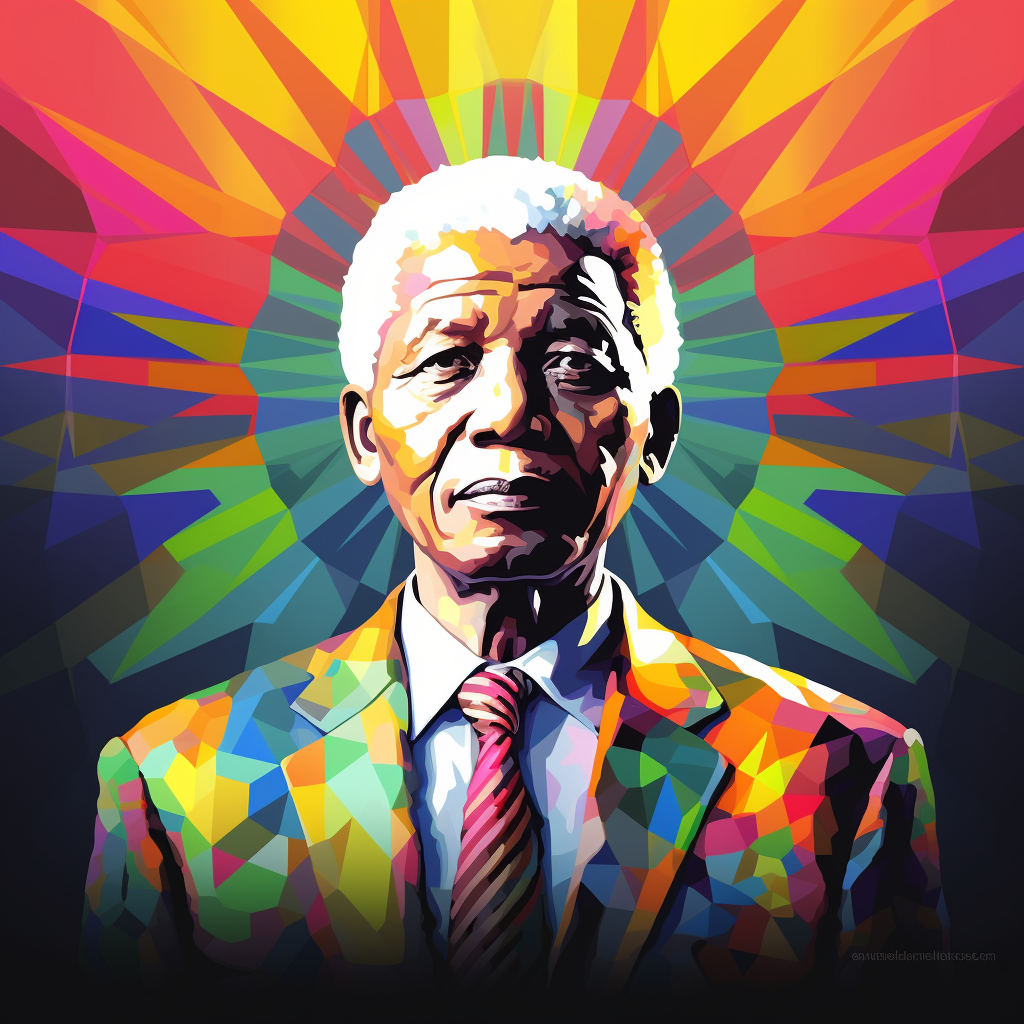
Mandela’s leadership resonated globally, earning him the Nobel Peace Prize and establishing a legacy that transcends South Africa. His journey, from the early days of his activism to his time as president, has inspired countless individuals around the world to fight for justice, equality, and human rights.
Nobel Peace Prize
In 1993, Mandela was awarded the Nobel Peace Prize alongside F.W. de Klerk for their efforts in peacefully ending apartheid and laying the groundwork for a new democratic South Africa. This prestigious award solidified Mandela’s status as a global icon, demonstrating the transformative power of his leadership and the enduring impact of his commitment to peace and reconciliation.
Mandela’s Nobel Peace Prize acceptance speech was a powerful call for a peaceful and just society, emphasizing the importance of reconciliation and the need to fight against discrimination and inequality. His words continue to resonate with people around the world, inspiring future generations to strive for a more equitable and harmonious world. The Nelson Mandela Foundation carries on this legacy by promoting his values and vision.
Legacy Beyond South Africa
Mandela’s legacy continues to inspire leaders and activists around the world, demonstrating the enduring power of his leadership. His dedication to peace, reconciliation, and social justice has inspired individuals to strive for a better world, despite facing seemingly insurmountable challenges.
From the civil rights movement in the United States to global initiatives advocating for education, women’s rights, and healthcare, Mandela’s impact extends far beyond the borders of South Africa. His life and achievements serve as a beacon of hope and a powerful reminder that change is possible when we stand united in the pursuit of justice and equality.
Summary
Nelson Mandela’s inspiring journey from a young activist to South Africa’s first black president serves as a testament to the power of resilience, diplomacy, and an unwavering commitment to justice. Through his early influences, experiences in prison, and his role in negotiating the end of apartheid, Mandela’s leadership shaped a new democratic South Africa built on the foundations of inclusiveness, unity, and social justice.
As we reflect on Mandela’s legacy, we are reminded of the transformative power of hope, reconciliation, and collective action. His life and achievements continue to inspire leaders and activists around the world, serving as a powerful reminder that change is possible when we stand united in the pursuit of justice and equality.
Frequently Asked Questions
What is the leadership trait of Nelson Mandela?
Nelson Mandela exhibited exceptional leadership traits such as peace advocacy, a powerful presence, high level of forgiveness, positive thinking, and focus on goals and missions beyond himself. His remarkable character inspired millions around the world.
How did Nelson Mandela show servant leadership?
Nelson Mandela practiced servant leadership through his dedication to listening, empathizing, and persuading others in order to promote justice. He encouraged freedom for himself and others and took advantage of opportunities to improve the conditions of people he served, all while standing firm to his vision.
What values did Chief Jongintaba Dalindyebo instill in young Mandela?
Chief Jongintaba Dalindyebo instilled the values of humility, patience and the importance of listening in young Mandela, shaping him to become a leader who respected others and valued learning.
How did Mandela's time in prison shape his leadership?
Mandela's time in prison taught him resilience and helped him develop the strong leadership qualities which ultimately made him an iconic leader.
What role did Mandela play in negotiating the end of apartheid?
Nelson Mandela's diplomatic efforts and focus on reconciliation were instrumental in negotiating the end of apartheid in South Africa, leading to the dismantling of an unjust system.



